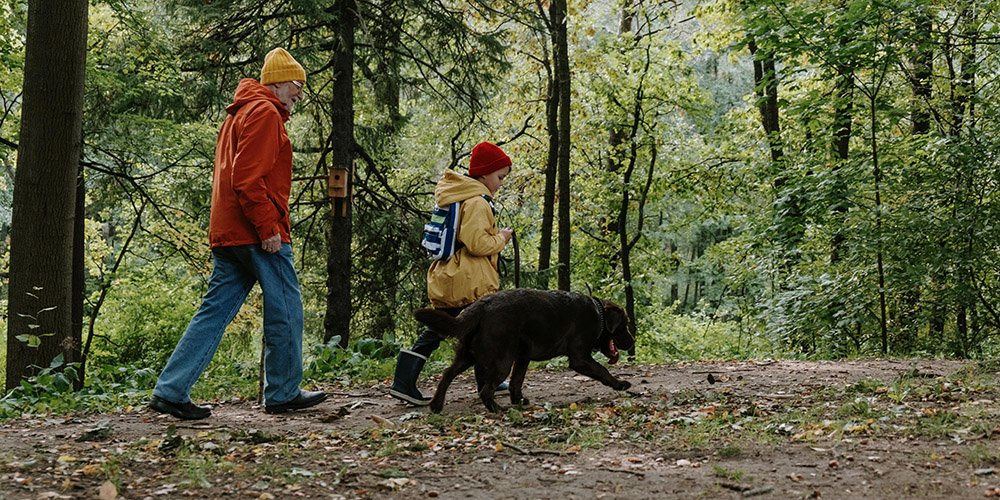Best Hiking Dogs: Top 10 Breeds and Useful Tips
Hiking with a dog can be one of the most rewarding outdoor experiences for both you and your furry companion. Not only does it provide great exercise and mental stimulation for your dog, but it also strengthens the bond between you two as you explore the great outdoors together. Dogs are naturally curious and adventurous, making them perfect hiking buddies.
When considering the best hiking dogs, it’s important to choose a breed that matches your hiking style and environment. Some dogs are better suited for long, strenuous hikes, while others may be more comfortable on shorter, less intense trails. The key factors to look for in a good hiking dog include endurance, temperament, size, health, and trainability. These traits ensure that your dog can keep up with you, stay safe, and enjoy the experience just as much as you do.
What Makes a Dog Breed Good for Hiking?
Endurance and Stamina
A good hiking dog needs to have plenty of energy and the ability to sustain physical activity over long periods. Breeds with high endurance can handle long trails and challenging terrain without tiring easily.
Temperament and Behavior
Hiking often involves encountering other hikers, wildlife, and various obstacles. A dog with a calm, friendly temperament is easier to manage in these situations. Breeds that are social and well-behaved in different environments make the best hiking companions.
Size and Strength
While both large and small dogs can be great hikers, it’s essential to consider the size and strength of your dog relative to the type of hikes you plan. Larger dogs can handle rougher terrain and carry their supplies, while smaller dogs are more portable and can be easier to manage on steep or narrow trails.
Health and Fitness
A healthy, fit dog is crucial for hiking. Breeds that are prone to health issues or have low energy levels may struggle with the demands of hiking. Choose a breed that is known for good overall health and has a physique suited for physical activity.
Trainability and Obedience
Obedience is key for a safe and enjoyable hike. A dog that responds well to commands and is easily trainable will be easier to manage on the trail. Breeds known for their intelligence and trainability are often the best choices for hiking.
Also read: 100 Hiking Puns to Spice Up Your Next Hike
10 Best Dog Breeds for Hiking
1. Siberian Husky

Siberian Huskies are medium-sized working dogs known for their striking appearance, featuring piercing blue or multicolored eyes and a thick double coat. Originally bred by the Chukchi people of Siberia for pulling sleds over long distances, Huskies are built for endurance and strength.
Why They Are Great for Hiking
- Endurance: Huskies are bred for long-distance running and can handle extended hikes with ease.
- Energy Levels: They have high energy levels and thrive on physical activity, making them perfect companions for active hikers.
- Adaptability: Their thick coat protects them from both cold and warm temperatures, allowing them to be comfortable in various weather conditions.
Tips for Hiking with a Siberian Husky
- Regular Exercise: Ensure your Husky gets plenty of exercise before the hike to help manage their energy levels.
- Hydration: Huskies can overheat easily, so bring plenty of water and take frequent breaks to keep them hydrated.
- Leash Training: Huskies have a strong prey drive, so it’s essential to have good leash control and ensure they are well-trained to follow commands.
2. Labrador Retriever

Labrador Retrievers are one of the most popular dog breeds in the world. They are known for their friendly and outgoing nature, as well as their versatility and intelligence. Labs are medium to large-sized dogs with a strong, athletic build and a short, dense coat.
Why They Are Great for Hiking
- Friendly Nature: Labs are sociable and get along well with other hikers and dogs, making the hiking experience enjoyable.
- Stamina: They have a lot of stamina and can handle long hikes, even in challenging terrain.
- Versatility: Labs are adaptable to various environments and can easily transition from a casual stroll to a strenuous hike.
Tips for Hiking with a Labrador Retriever
- Frequent Breaks: Labs love to explore, so give them time to sniff around and take breaks to prevent overexertion.
- Swimming Opportunities: If your hike involves water, let your Lab take a dip. They love swimming and it helps them cool down.
- Healthy Diet: Ensure your Lab is on a high-quality diet to maintain their energy levels and overall health for hiking.
3. Australian Shepherd

Australian Shepherds, or Aussies, are medium-sized herding dogs known for their intelligence, agility, and striking merle coats. Despite their name, they were developed in the United States for herding livestock.
Why They Are Great for Hiking
- Intelligence: Aussies are highly intelligent and easily trainable, making them responsive and well-behaved on trails.
- Agility: Their agility allows them to navigate rough terrain and obstacles with ease.
- Energy Levels: They have high energy levels and require plenty of physical and mental stimulation, making hiking an ideal activity.
Tips for Hiking with an Australian Shepherd
- Mental Stimulation: Keep your Aussie engaged with commands and tasks during the hike to prevent boredom.
- Regular Training: Continually work on obedience and recall training to ensure they stay close and responsive.
- Protection from Heat: Aussies can overheat due to their thick coats, so hike during cooler parts of the day and provide plenty of water.
4. Border Collie

Border Collies are medium-sized herding dogs renowned for their intelligence, agility, and work ethic. With a strong instinct to herd and an incredible ability to learn, Border Collies are often seen in competitive dog sports and working on farms.
Why They Are Great for Hiking
- High Energy: Border Collies have boundless energy and thrive on physical activity, making them ideal for long, challenging hikes.
- Obedience: Their high intelligence and trainability mean they are quick to learn commands and respond well to their owner’s instructions.
- Agility: They can navigate complex terrains and obstacles with ease, thanks to their agility and nimbleness.
Tips for Hiking with a Border Collie
- Mental Challenges: Incorporate tasks and games into your hike to keep your Border Collie mentally stimulated and engaged.
- Consistent Training: Maintain regular obedience training to ensure your dog remains well-behaved and responsive on the trail.
- Frequent Breaks: While they have high energy, it’s important to give them regular breaks to prevent overexertion.
5. Bernese Mountain Dog

Bernese Mountain Dogs are large, sturdy dogs with a calm and gentle disposition. Originally from the Swiss Alps, they were bred for drafting and droving, making them strong and reliable working dogs.
Why They Are Great for Hiking
- Strength: Their powerful build allows them to handle rough terrain and carry supplies if needed.
- Calm Nature: They have a calm and steady temperament, which makes them easy to manage on the trail.
- Endurance: Bernese Mountain Dogs can endure long hikes, especially in cooler climates, thanks to their thick coat.
Tips for Hiking with a Bernese Mountain Dog
- Cool Weather: They prefer cooler temperatures, so plan hikes during cooler parts of the day or in cooler seasons.
- Hydration: Ensure they stay hydrated, as their thick coat can cause them to overheat more easily.
- Pacing: Keep a moderate pace and take breaks to accommodate their slower, steady walking style.
Also read: Must-Have Winter Hiking Gear for a Great and Safe Experience
6. Alaskan Malamute

Alaskan Malamutes are large, powerful dogs originally bred for hauling heavy freight as sled dogs in the Arctic. They are known for their strength, endurance, and friendly, outgoing nature.
Why They Are Great for Hiking
- Endurance: Bred for long-distance travel, Malamutes have the stamina to handle extended hikes over varied terrain.
- Strength: Their robust build allows them to navigate difficult trails and carry their own supplies.
- Adaptability: They can handle extreme weather conditions, from cold to warm, making them versatile hiking companions.
Tips for Hiking with an Alaskan Malamute
- Cool Climates: Prefer hiking in cooler weather to prevent overheating.
- Hydration and Nutrition: Keep them well-hydrated and bring along high-energy snacks to maintain their strength and stamina.
- Training and Socialization: Ensure they are well-trained and socialized, as Malamutes can be independent and strong-willed. Regular obedience training is essential for a safe and enjoyable hiking experience.
7. German Shepherd

German Shepherds are large, intelligent, and versatile dogs known for their loyalty and working abilities. Originally bred in Germany for herding sheep, they are now commonly used in police and military roles due to their trainability and strength.
Why They Are Great for Hiking
- Loyalty: German Shepherds are incredibly loyal and protective, always staying close to their owners and looking out for them.
- Intelligence: Their high level of intelligence makes them easy to train and responsive to commands, which is crucial for a safe hiking experience.
- Versatility: They are adaptable to various terrains and can handle both short and long hikes with ease.
Tips for Hiking with a German Shepherd
- Consistent Training: Keep up with obedience training to ensure they remain responsive and well-behaved on the trail.
- Regular Exercise: Provide ample exercise before the hike to manage their energy levels.
- Hydration and Rest: Ensure they stay hydrated and take regular breaks, especially in hot weather, to prevent overheating.
8. Vizsla

Vizslas are medium-sized hunting dogs from Hungary, known for their sleek, golden-rust coat and lean, muscular build. They are affectionate, energetic, and highly trainable, making them excellent companions for active families.
Why They Are Great for Hiking
- Speed: Vizslas are fast and agile, allowing them to navigate trails quickly and efficiently.
- Stamina: They have high endurance and can handle long hikes without tiring easily.
- Affectionate Nature: Vizslas form strong bonds with their owners and enjoy spending time with them, making them enthusiastic hiking partners.
Tips for Hiking with a Vizsla
- Regular Training: Maintain regular obedience training to ensure they respond well to commands.
- Hydration: Vizslas can overheat, so bring plenty of water and take frequent breaks to keep them cool.
- Protective Gear: Consider using protective boots to shield their paws from rough terrain.
9. Rhodesian Ridgeback

Rhodesian Ridgebacks are large, muscular dogs originally bred in Africa to hunt lions and protect property. They are known for their distinctive “ridge” of hair along their back that grows in the opposite direction of their coat.
Why They Are Great for Hiking
- Endurance: Bred for endurance, Rhodesian Ridgebacks can handle long distances and challenging terrains.
- Protection Instincts: Their natural protective instincts make them reliable companions in the wilderness.
- Strength: They are strong and capable of navigating tough trails, making them excellent hiking partners.
Tips for Hiking with a Rhodesian Ridgeback
- Socialization: Ensure they are well-socialized to prevent aggressive behavior towards other hikers or animals.
- Hydration and Nutrition: Keep them well-hydrated and provide high-energy snacks to maintain their stamina.
- Regular Training: Continue obedience training to ensure they remain responsive and well-behaved on the trail.
10. Jack Russell Terrier

Jack Russell Terriers are small, energetic dogs known for their lively and spirited nature. Originally bred in England for fox hunting, they possess a strong prey drive, boundless energy, and a sturdy build despite their small size.
Why They Are Great for Hiking
- Energy: Jack Russells are incredibly energetic and can keep up with long hikes, always eager to explore and move.
- Agility: Their agility allows them to navigate rough terrains and obstacles with ease, making them perfect for hiking trails.
- Compact Size: Their small size makes them easy to carry if necessary and they require less food and water compared to larger breeds.
Tips for Hiking with a Jack Russell Terrier
- Regular Exercise: Ensure they get regular exercise to help manage their high energy levels before and during hikes.
- Leash Training: Due to their strong prey drive, it’s essential to have good leash control and ensure they are well-trained to follow commands.
- Hydration: Bring plenty of water and take frequent breaks to keep them hydrated, as their small size makes them prone to overheating.
Also read: Trekking Pole Tips: Finally Use Them Right!
Recap
Hiking with a dog can be an incredibly rewarding experience, and choosing the right breed is essential to ensure both you and your furry friend enjoy the adventure. Here’s a recap of the top 10 breeds for hiking:
- Siberian Husky
- Labrador Retriever
- Australian Shepherd
- Border Collie
- Bernese Mountain Dog
- Alaskan Malamute
- German Shepherd
- Vizsla
- Rhodesian Ridgeback
- Jack Russell Terrier
When selecting the best hiking dog breed, it’s important to consider your dog’s individual needs and fitness levels. Every dog is unique, and their suitability for hiking depends on various factors such as endurance, temperament, size, health, and trainability. By understanding these traits, you can choose a dog that will thrive on hiking adventures and make your outdoor experiences even more enjoyable.
Additional Tips for Hiking with Dogs
Hydration and Nutrition
- Water: Always bring enough water for both you and your dog. Take frequent breaks to ensure your dog stays hydrated.
- Snacks: Pack high-energy snacks or treats to keep your dog’s energy levels up during the hike.
Training and Obedience
- Commands: Make sure your dog knows basic commands such as sit, stay, and recall. This ensures they remain safe and responsive on the trail.
- Leash Training: Practice good leash control and use a sturdy leash to manage your dog, especially in areas with wildlife or other hikers.
Safety Precautions
- First Aid Kit: Carry a basic first aid kit for dogs, including bandages, antiseptic wipes, and tweezers for removing ticks.
- Identification: Ensure your dog wears a collar with identification tags, and consider microchipping them for added security.
Gear Recommendations
- Harness: Use a comfortable and secure harness to give you better control and reduce strain on your dog’s neck.
- Boots: Consider using protective boots to shield your dog’s paws from rough or hot surfaces.
- Backpack: If your dog is large enough, consider a dog backpack for them to carry their supplies, balancing the load evenly.
By following these tips and choosing a breed that fits your hiking style, you and your dog can enjoy many happy and safe adventures together.








